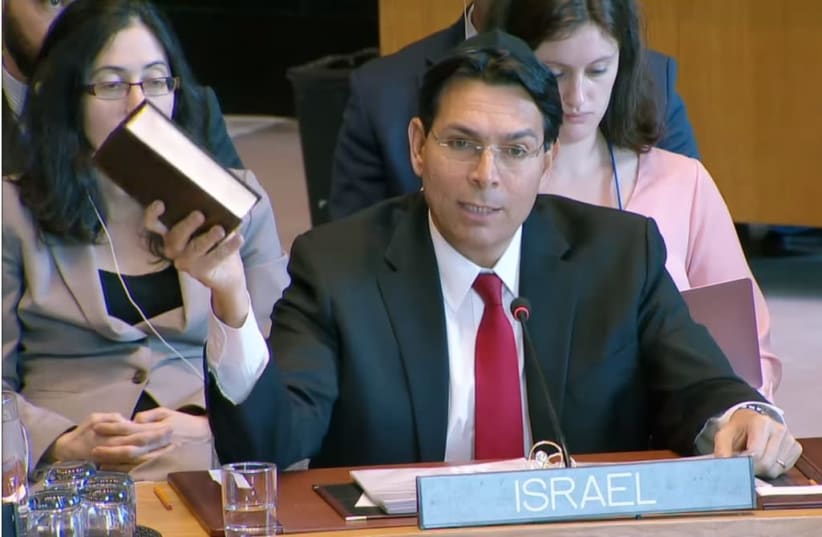Wearing a kippah and reading from the Bible, Danon defended Israel's right to the land of Israel.Since then, translations into Spanish, Polish, French, Portuguese and Turkish have swept the internet. Last week, on Israel's Independence Day, CNN brought Danon on to discuss the speech where he reiterated the Jewish state's historical and moral claims to the country that many local Arab residents would like to see as Palestine.A Palestinian media outlet published a lengthy editorial decrying the speech.
”From the book of Genesis; to the Jewish exodus from Egypt; to receiving the Torah on Mount Sinai; to the gates of Canaan; and to the realization of God’s covenant in the Holy Land of Israel; the Bible paints a consistent picture. The entire history of our people, and our connection to Eretz Yisrael, begins right here,” Danon stated at the UN Security council in New York.
He continued referencing the Balfour Declaration of 1917, the League of Nations mandate of 1922, and the United Nations charter of 1945 as all legitimizing Israel's right to self-determination. "The speech has resonated thanks to the strength of the truth. Its success has been welcome news as we conveyed to the world the strength of the eternal connection between the Jewish people and the Land of Israel," Danon stated about the speech going viral.
In the speech, Danon put forward four pillars on which peace would be based in the future. This includes: Palestinians recognition of Israel as a Jewish state; an end to Palestinians incitement; regional cooperation and acceptance of Israel’s security needs.
The 1948 armistice lines that marked the end of the Independence War, “were never considered international borders. They were simply lines designating the end of the first battle in the Arab war against Israel,” Danon said.
“It was the Arabs who insisted that the armistice lines would not be permanent borders,” he added.
“Because these lines are not borders, the Jewish communities in Judea and Samaria, to this day, do not cross any international borders. They are built on strategic land for Israel’s security and, as agreed by the parties in the Oslo Accords, would be classified as final status issues,” he concluded.
On the issue of security, he noted that Arab leaders had chosen violence long before settlements were built. The PLO was established in 1964, three years prior to the Six Day War in 1967.
“What did they need to liberate before 1967? And in 1964, not a single settlement existed in Judea and Samaria, and our right to exist was still rejected,” he said.Palestinian Ambassador to the UN Riyad Mansor who spoke before Danon said that it was the Palestinians who had a historic and legal right to the land.
In a follow-up interview to his UN speech, Danon told CNN's Becky Anderson he didn't see territorial comprise as an intelligent way towards peace. "The fact is Israel withdrew from Gaza completely in 2005, we don't have any so-called settlements, no occupation in Gaza. Hamas took over a few months after we left Gaza, and today look what happened. Hamas is committing a double war crime, targeting the Israeli civilian population while hiding behind the poor people in Gaza"
An ambassador since 2015, Danon previously served as Deputy Defense Minister.Ben Bresky and Tovah Lazaroff contributed to this article.
